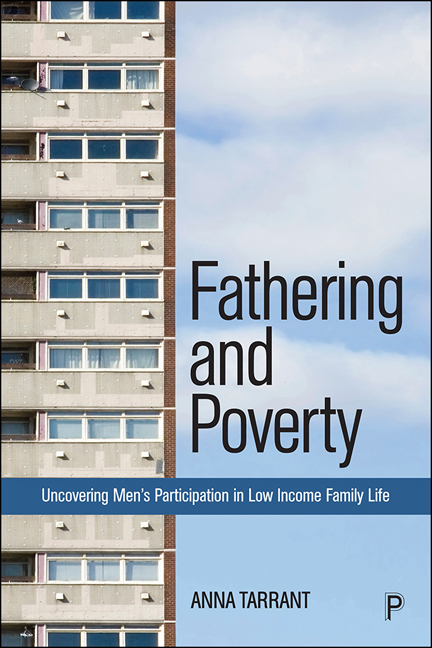Book contents
- Frontmatter
- Dedication
- Contents
- List of figures and tables
- List of abbreviations
- About the author
- Acknowledgements
- 1 Introduction: Fathering, poverty, families and policy
- 2 Low-income fatherhoods in historical and political context
- 3 Theorising men’s participation in low-income families
- 4 Supporting men in low-income contexts: practitioner observations
- 5 Men’s caring arrangements and family trajectories
- 6 Familial economic circumstances and provisioning practices
- 7 Men’s family participation in low-income urban neighbourhoods
- 8 Conclusion: Men’s family participation in low-income contexts
- Appendix A Participant information
- Appendix B ‘Existing evidence’ document shared at the knowledgeexchange workshop
- Notes
- References
- Index
8 - Conclusion: Men’s family participation in low-income contexts
Published online by Cambridge University Press: 30 April 2022
- Frontmatter
- Dedication
- Contents
- List of figures and tables
- List of abbreviations
- About the author
- Acknowledgements
- 1 Introduction: Fathering, poverty, families and policy
- 2 Low-income fatherhoods in historical and political context
- 3 Theorising men’s participation in low-income families
- 4 Supporting men in low-income contexts: practitioner observations
- 5 Men’s caring arrangements and family trajectories
- 6 Familial economic circumstances and provisioning practices
- 7 Men’s family participation in low-income urban neighbourhoods
- 8 Conclusion: Men’s family participation in low-income contexts
- Appendix A Participant information
- Appendix B ‘Existing evidence’ document shared at the knowledgeexchange workshop
- Notes
- References
- Index
Summary
Fathering and Poverty both connects with and contributes to, ongoing public and policy debates and interdisciplinary scholarship about pressing and intersecting societal discussions and debates. These include men, masculinities and fatherhood; gender and care; and the lived experiences of family poverty. Taking forward ideas about fathering, families and poverty in new ways that have implications for practice and policy, this chapter confirms the overall thesis for the book. It argues that in a context of social ambivalence about men as carers, men with caring responsibilities remain highly isolated and welfare and market provision for ‘caring masculinities’ is being neither produced nor sustained.
In evidencing this argument and elaborating these advances, the key conclusions from the MPLC study are summarised to foreground the dynamic, relational, intersectional and context-specific character of men's experiences of low-income family life and caregiving across the lifecourse. This necessarily more complicated view of men and their participation in low-income families and contexts supports a more detailed understanding of the complex and evolving relationship between fathers, poverty, families and policy. I also re-emphasise that the realities of family and fathering for men in low-income contexts are often rendered invisible in research despite their heightened visibility in policy and public arenas.
It is important to acknowledge here that in bringing men's family participation in low-income families to the fore, the intention is not to generalise about the diverse and divergent trajectories and biographies of men in low-income families. Similarly, the arguments made are not offered to deny when some men are absent from households and family contexts. Indeed, Chapter 1 presents statistical evidence of father absence from households caused by change in family structures and within couple relationships. Chapter 7 also considers some of the mechanisms and processes that produce men's familial absence, highlighting where men are sometimes present in problematic ways as well. However, qualitative accounts of the meaning and experience of family for men, alongside evidence of some of the vital contributions that men make in low-income family contexts, are explored here in a societal context where they are typically obscured, broadly stigmatised and men are deprived both of recognition of their capabilities to care and of recognition of the value and significance of their family identities.
- Type
- Chapter
- Information
- Fathering and PovertyUncovering Men's Participation in Low-Income Family Life, pp. 173 - 198Publisher: Bristol University PressPrint publication year: 2021

